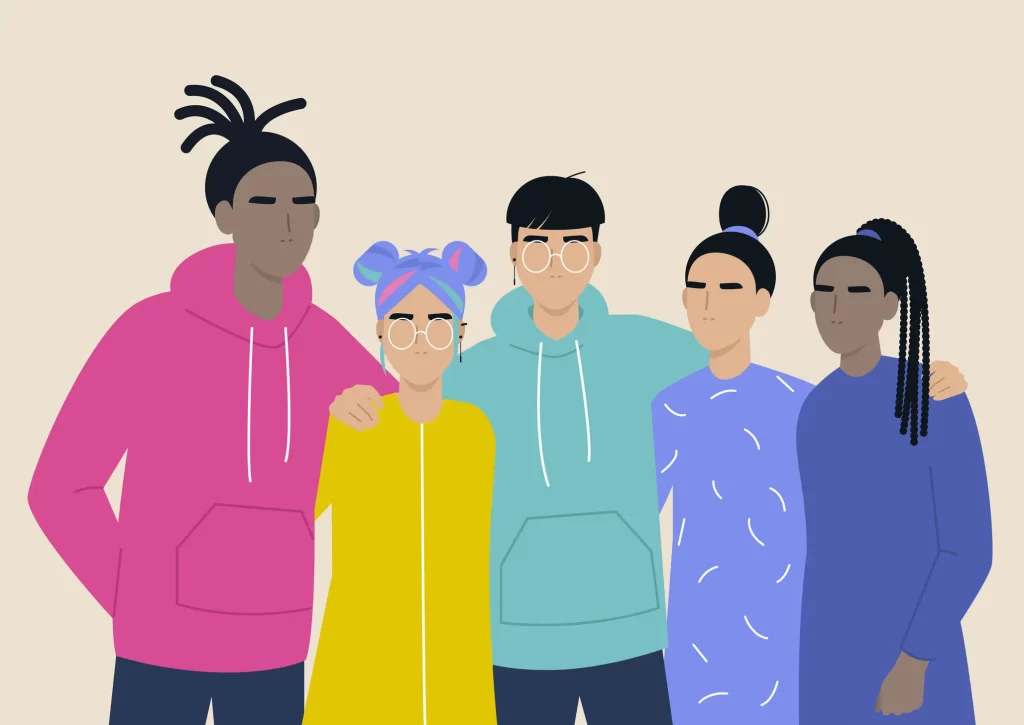BOSTON, July 21, 2021—A study published in the Journal of Adolescent Health finds that a social transition during childhood or adolescence is not harmful to transgender or gender diverse youth, but experiences of harassment based on gender identity in K-12 school environments are. The study was authored by researchers at The Fenway Institute, Massachusetts General Hospital (Harvard Medical School), and the Stanford University School of Medicine and is believed to be the first to examine mental health outcomes in adulthood of transgender people who experienced social transition during childhood or adolescence. It contributes important new knowledge to the growing body of research documenting the harm that transgender and gender diverse people experience when they are exposed to societal stigma and discrimination based on gender identity.
Social transition describes the process by which transgender children or adolescents adopt the name, pronouns, and gender expression, such as clothing and haircuts, that match their gender identity. Of the 9,711 study participants, 165 (1.7%) reported having undergone social transition in childhood (defined as ages 3-9, with age 10 used as an approximate prepubertal cutoff since the ages at which study participants reached puberty were not available) and 1,196 (12.3%) underwent social transition during adolescence (between 10 and 17 years old). The remainder did not transition until adulthood. Those who socially transitioned during childhood and adolescence were much more likely to have experienced harassment based on gender identity from classmates, teachers, or school staff than those who did not transition until they were adults.
There were no associations between social transition during childhood and adverse mental health outcomes when compared with social transition during adulthood. Instead, childhood social transition was associated with lower odds of lifetime marijuana use when compared to waiting until adulthood to socially transition. For many patients, marijuana is a method of trying to reduce anxiety, and this finding suggests that an earlier social transition may lead to better mental health.
Social transition during adolescence initially seemed to be associated with greater odds of some measures of suicidality compared with social transition during adulthood. When these results were adjusted for K-12 harassment based on gender identity, however, associations between social transition during adolescence and adverse mental health outcomes were no longer statistically significant.
“These results strongly suggest that social transition itself will not harm transgender and gender diverse youth. But harassment based on gender identity from classmates, teachers, and school staff is very harmful,” said study senior author Alex S. Keuroghlian, MD, who directs the National LGBTQIA+ Health Education Center at The Fenway Institute and the Massachusetts General Hospital Psychiatry Gender Identity Program. “An unaccepting environment is not an appropriate reason to withhold a social transition, but it is critical that clinicians who are providing care for transgender and gender diverse youth undergoing a social transition understand the potential harm that can occur in an unsupportive school environment. Care plans must include guidance around the importance of seeking a school context that is accepting and validating of transgender and gender diverse youth.”
Social transition during adolescence (i.e., after the onset of puberty) is an appropriate, affirming, and ethical treatment option, as the majority of transgender adolescents maintain their gender identity into adulthood. Recommending social transition for prepubertal youth has been an area of controversy in pediatrics. Some clinicians claim that a child may no longer identify with a gender different from their sex assigned at birth after puberty, and the process of detransitioning could lead to social stress. Others note that preventing prepubertal children from socially transitioning may lead to shame about their gender identity as well as damaged relationships between the child and their parents and clinicians.
“We can no longer afford to ignore the growing evidence that higher rates of adverse mental health outcomes experienced by many transgender people are due to discrimination, stigma, and unsupportive social environments,” said Jack Turban, MD, fellow in child and adolescent psychiatry at Stanford University School of Medicine and lead author of the study. “Protecting transgender and gender diverse youth from unaccepting school environments is critical for good mental health.”
“Timing of Social Transition for Transgender and Gender Diverse Youth, K-12 Harassment, and Adult Mental Health Outcomes,” is based on data from the 2015 U.S. Transgender Survey conducted by the National Center for Transgender Equality which surveyed over 27,000 transgender people in all 50 states, Washington D.C., Puerto Rico, U.S. territories abroad, and U.S. military bases on a multitude of questions about their lives. The paper is the latest in a series of secondary analyses of the groundbreaking survey evaluating factors that affect the mental health outcomes of transgender and gender diverse people. Prior papers include “Factors Leading to ‘Detransition’ Among Transgender and Gender Diverse People in the United States: A Mixed-Methods Analysis,” published in 2021 in LGBT Health, “Association Between Gender-Affirming Surgeries and Mental Health Outcomes,” published in 2021 in JAMA Surgery, “Pubertal Suppression for Transgender Youth and Risk of Suicidal Ideation,” published in 2020 in Pediatrics, and “Association Between Recalled Exposure to Gender Identity Conversion Efforts and Suicide Attempts,” published in 2019 in JAMA Psychiatry.
“Timing of Social Transition for Transgender and Gender Diverse Youth, K-12 Harassment, and Adult Mental Health Outcomes” is available online here.


